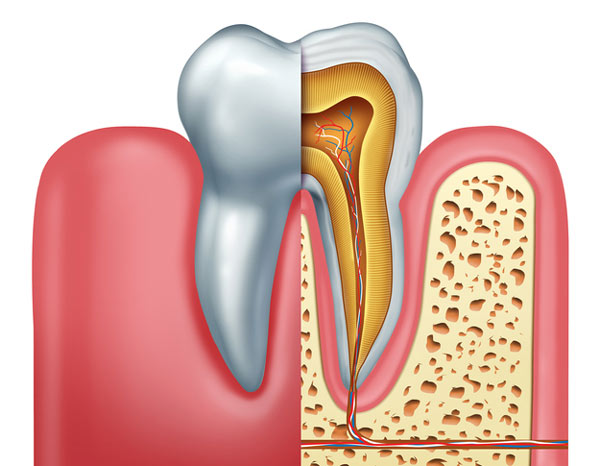Root Canal
 A root canal may be necessary to save a tooth that is severely infected. Despite common misconceptions, there is no need to worry about your root canal procedure, especially here at Jessica Barr D.D.S., Family Dentistry. Thanks to advances in technology and techniques, root canal treatment is virtually painless and relatively comfortable. Your root canal should relieve any pain you have due to an infection, and restore your tooth to a healthy state. A root canal may be necessary to save a tooth that is severely infected. Despite common misconceptions, there is no need to worry about your root canal procedure, especially here at Jessica Barr D.D.S., Family Dentistry. Thanks to advances in technology and techniques, root canal treatment is virtually painless and relatively comfortable. Your root canal should relieve any pain you have due to an infection, and restore your tooth to a healthy state.
Why You May Need a Root Canal
The bacteria in plaque can wreak havoc on your oral health. In response to this bacteria, our immune systems produce toxins that unfortunately also target healthy tissues. This leads to an infection. Inside your tooth, beneath the enamel and dentin layers, there is a soft tissue known as pulp. If this infection reaches the pulpy center of your tooth, you will likely need a root canal. The pulp contains nerves, connective tissues, and blood vessels, making it extremely sensitive to irritation, inflammation, and infection. These issues may be the result of large fillings, a fracture or crack in the tooth, or trauma to the face.
If your pulp becomes irritated, infected, or inflamed you may experience the following symptoms:
| • |
Severe toothaches or pain when chewing
|
| • |
A dark discoloration of the tooth
|
| • |
Swollen or tender gums near the tooth
|
| • |
Extreme sensitivity to hot and cold temperatures
|
| • |
A recurring pimple on the gums |
These symptoms are strong indicators that you may need root canal treatment. Without treatment, an infection can become severe enough to result in tooth loss or extraction.
Root Canal Procedure
Before your procedure begins, Dr. Jessica Barr will administer a local anesthetic to numb the tooth. After the area is numb, we may place a small sheet of rubber around the tooth to keep it clean and dry during your procedure. Next, we use a small hand tool, typically a drill, to create a hole in the top of the tooth. This hole allows us to access the pulp.
Once the pulp is exposed, we will remove any damaged or diseased tooth material. We may also irrigate the inner chamber of the tooth to wash away any remaining pulp. An antimicrobial solution will kill off any remaining bacteria and reduce your chances of future infection.
Once the chamber is clean and dry, we will fill it with a rubber-like material known as gutta-percha. Gutta-percha seals off the area from bacteria and strengthens the structure of the tooth. The final step involves filling the opening at the top of your tooth with a temporary filling.
After Your Root Canal
A tooth that has undergone root canal treatment may become brittle without its pulp. To prevent any structural problems, the tooth usually needs a permanent dental crown. A crown is used to restore the function and aesthetics of a damaged tooth. Once you receive your crown, you can treat your tooth as you would any other tooth. Be sure to implement strong oral hygiene practices, such as daily brushing and flossing.
Schedule an Appointment
If you have any of the symptoms listed above, you may need a root canal. Call 315-393-7236 to schedule your appointment now! |